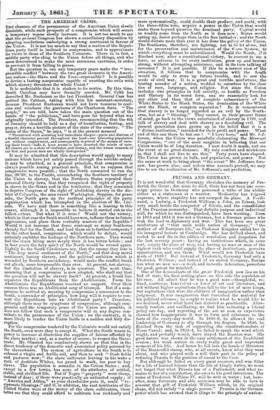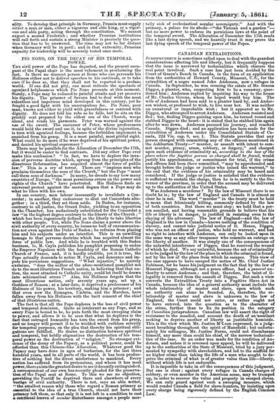PRUSSIA AND GERMANY.
IT is not wonderful that Germany cherishes the memory of Fre- derick the Great ; for, since he died, there has not been one sove- reign prince in Germany who possessed a tithe of his ability either as a statesman or a warrior. Mediocrity has reigned supreme, where stupidity has not usurped its place. A Ferdi- nand, a Ludwig, a Frederick William, a John, an Ernest, look very small beside the conqueror of Silesia, and the consolidator of the Prussian monarchy. That definite purpose and individual will, for which he was distinguished, have been wanting. Even in 1813 and 1814 it was not a German, but a Russian prince who took the lead in diplomacy and war. This has been one great misfortune of "that most noble nation of Germany," "the mother of all European life," as Professor Kingsley called her in his inaugural lecture at Cambridge. She has drifted about, and reeled to and fro in the eddies of revolution and despotism for the last seventy years ; having no institutions which, in some sort, supply the place of men, and having no man or men of the highest rank who could supply the place of institutions, perceive opportunities, and use them. What would not Frederick have made of 1S49? But instead of Frederick, Germany had only a Frederick William ; and instead of an united Germany, Europe has what we now see—a weak and imbecile federation, powerless for good, potent for mischief.
One of the descendants of the great Frederick now lies on his bed of state, his final resting-place on this side the sepulchre of his race. All admit that he was a good man—thoughtful, re- fined, courteous, benevolent—a lover of art and literature, and not without higher aspirations than fall to the lot of most kings, but aspirations that were the children of imagination rather than judgment. It was imagination that furnished the material for his political schemes ; he sought to realize what he would like to see realized, never what hard fact dictated as practicable. Alter- nately resolute and vacillating, we find him initiating a liberal policy one day, and repenting of the act as soon as experience showed how inappropriate it was in form and substance to the facts of the every-day world. In 1848-9, he allowed the real leadership of Germany to slip through his fingers. In 1830, he flinched from the task of supporting the constitutionalists of Hesse Cassel; and, in 1853-4, he failed to speak the word which might, and probably would, have stayed the Russian war. His good nature was shown in the easy settlement of the Neufchatel cession ; his weak nature in every really great and important moment of his life. And hence he fell into the hands of Ministers of the 3tlanteuffel stamp, who, at all events, knew what they were about, and who played with a will their part in the policy of reducing Prussia to the position of vassal to the Czar. But although he failed on every great occasion, and was fitter
for a life of learned leisure than the life of kingly duties, we must not forget that what Prussia has of a Parliament, and what re- mains to her of a constitution, she owes to his good intentions. The name of Frederick William IV. will be writ in water ; but, here- after, some fortunate and able successor may be able to turn to . account that gift of Frederick William which, in its original shape, did not satisfy "a single person." Prussia is the German power which has avowed that it clings to the principle of nation-
silty. To develop that prinoiple in Germany, Prussia must supply either a man or men, either a vigorous and able king, or a vigor- ous and able party, acting through the constitution. We cannot expect a second Frederick ; and whether Prussian institutions will call forth and sustain a strong Minister is precisely the ques- tion that bas to be answered. The time may not be far distant when Germany will be in peril ; and in that extremity, Prussian capacity for leadership will be severely tested once more.































 Previous page
Previous page